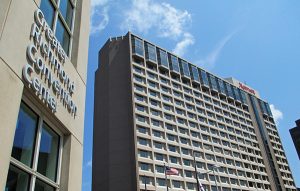
A screenshot of a page on Baskervill’s website, where the local architecture firm has been pitching the concept of converting empty hotels for healthcare use.
With an abundance of vacant rooms on their hands, area hotel operators are putting at least some of those rooms to new use while trying to weather the coronavirus downturn.
From providing temporary housing for displaced families to overflow capacity for hospitals in need of beds, several hotels and motels are opening their doors to whatever business they can get, while also playing a part in responding to the crisis.
Kelly King Horne, executive director of Homeward, said the homeless services nonprofit is using about 70 hotel rooms at two undisclosed properties in the city, reducing those numbers from as many as 80 rooms and three properties a couple weeks earlier as occupants have been moved to other shelters or housing options.
Such use brings in some money for operators. King Horne said a three-month contract for a block of 50 rooms at one area motel came in at a room rate of about $75 a night. She declined to identify participating properties, citing safety concerns.
Funding for such expenses comes from federal, state and local sources, including stimulus funding provided through the CARES Act, and direct allocations from the City of Richmond and Henrico County.
On Tuesday, Richmond Mayor Levar Stoney announced an additional $300,000 in city funding for Homeward, as part of a $5.8 million local and federal funding package aimed at increasing emergency shelter capacity and other housing services for vulnerable populations at higher risk of contracting the virus.
In addition to providing temporary housing, King Horne said hotel stays arranged by Homeward include meals delivered to some occupants’ doors, with assistance from CARITAS. She said they’re looking at having a food vendor prepare and distribute meals on an ongoing basis.
Needs in flux
As for providing shelter, King Horne said Homeward continues to assess whether more hotel rooms may be needed going forward. She said hotels are a more expensive way of providing emergency shelter, but a need for more beds was present prior to the pandemic.
“Before the pandemic, we had about 330 shelter beds every night of the year, and that has never been enough,” King Horne said. “There was a three-week waiting period for single men to get access to emergency shelter, so there was a significant shortfall before the pandemic.”
King Horne said there may be a need for more rooms, though she emphasized that a goal is to place families and individuals in more stable housing that would in turn reduce the need for more beds. She said Homeward, part of a larger homeless services network called Greater Richmond Continuum of Care, is hoping to be able to fund a case manager to assist in that effort.
“We know that there are still people outside, and we would like to offer them a resource,” she said. “We’re trying to first streamline what’s happening, add the additional support, bring on additional resources and see what our gap is still.
“We really want to be strategic in how we do it. The public funding with the stimulus act is going to be really helpful, but we don’t want to make commitments that we can’t honor,” she said. “We might need more hotel rooms, we might, but we’re not sure what that looks like.”
Room for healthcare workers
Area hotels also are lending a helping hand to medical personnel on the frontlines of the pandemic.
John Cario, general manager of the downtown Hilton, said the hotel has been providing offsite catering and discounted room rates for medical responders, particularly those trying to keep a distance from their homes to prevent potential exposure to their families.
“Certainly we appreciate all the frontline doctors, nurses and everyone handling this,” Cario said. “It perhaps isn’t said enough, but they’re really the true heroes helping out, and we just want to be supportive in this process and make sure everybody’s healthy and safe.”
Other operators are taking that support a step further, opening up rooms for healthcare use to help ensure adequate bed capacity at hospitals.
Mayur Patel, president of Richmond-based KM Hotels, recently told BizSense that his group had signed on with the state’s COVID-19 Taskforce to use two of its roughly two dozen hotels to relocate hospital patients and free up bed capacity.
The state has been fielding interest from other hotels in the region that could likewise potentially free up beds, while it has pulled back on a previously announced plan to use the Greater Richmond Convention Center as a field hospital.
Architecture firms, such as Richmond-based Baskervill and Dallas-based HKS, also have been pitching the concept of converting empty hotels into hospitals to their hospitality clients, with posts on their websites detailing suggested approaches.
“A lot of our hotel clients are trying to figure out, ‘Is there an alternate revenue stream with my empty, shuttered hotel?’” Baskervill President Bob Clark said. “We went through and did a quick analysis to say here’s what the best practice is, here’s the best use for a limited-service hotel in this environment.”

A screenshot of a page on Baskervill’s website, where the local architecture firm has been pitching the concept of converting empty hotels for healthcare use.
With an abundance of vacant rooms on their hands, area hotel operators are putting at least some of those rooms to new use while trying to weather the coronavirus downturn.
From providing temporary housing for displaced families to overflow capacity for hospitals in need of beds, several hotels and motels are opening their doors to whatever business they can get, while also playing a part in responding to the crisis.
Kelly King Horne, executive director of Homeward, said the homeless services nonprofit is using about 70 hotel rooms at two undisclosed properties in the city, reducing those numbers from as many as 80 rooms and three properties a couple weeks earlier as occupants have been moved to other shelters or housing options.
Such use brings in some money for operators. King Horne said a three-month contract for a block of 50 rooms at one area motel came in at a room rate of about $75 a night. She declined to identify participating properties, citing safety concerns.
Funding for such expenses comes from federal, state and local sources, including stimulus funding provided through the CARES Act, and direct allocations from the City of Richmond and Henrico County.
On Tuesday, Richmond Mayor Levar Stoney announced an additional $300,000 in city funding for Homeward, as part of a $5.8 million local and federal funding package aimed at increasing emergency shelter capacity and other housing services for vulnerable populations at higher risk of contracting the virus.
In addition to providing temporary housing, King Horne said hotel stays arranged by Homeward include meals delivered to some occupants’ doors, with assistance from CARITAS. She said they’re looking at having a food vendor prepare and distribute meals on an ongoing basis.
Needs in flux
As for providing shelter, King Horne said Homeward continues to assess whether more hotel rooms may be needed going forward. She said hotels are a more expensive way of providing emergency shelter, but a need for more beds was present prior to the pandemic.
“Before the pandemic, we had about 330 shelter beds every night of the year, and that has never been enough,” King Horne said. “There was a three-week waiting period for single men to get access to emergency shelter, so there was a significant shortfall before the pandemic.”
King Horne said there may be a need for more rooms, though she emphasized that a goal is to place families and individuals in more stable housing that would in turn reduce the need for more beds. She said Homeward, part of a larger homeless services network called Greater Richmond Continuum of Care, is hoping to be able to fund a case manager to assist in that effort.
“We know that there are still people outside, and we would like to offer them a resource,” she said. “We’re trying to first streamline what’s happening, add the additional support, bring on additional resources and see what our gap is still.
“We really want to be strategic in how we do it. The public funding with the stimulus act is going to be really helpful, but we don’t want to make commitments that we can’t honor,” she said. “We might need more hotel rooms, we might, but we’re not sure what that looks like.”
Room for healthcare workers
Area hotels also are lending a helping hand to medical personnel on the frontlines of the pandemic.
John Cario, general manager of the downtown Hilton, said the hotel has been providing offsite catering and discounted room rates for medical responders, particularly those trying to keep a distance from their homes to prevent potential exposure to their families.
“Certainly we appreciate all the frontline doctors, nurses and everyone handling this,” Cario said. “It perhaps isn’t said enough, but they’re really the true heroes helping out, and we just want to be supportive in this process and make sure everybody’s healthy and safe.”
Other operators are taking that support a step further, opening up rooms for healthcare use to help ensure adequate bed capacity at hospitals.
Mayur Patel, president of Richmond-based KM Hotels, recently told BizSense that his group had signed on with the state’s COVID-19 Taskforce to use two of its roughly two dozen hotels to relocate hospital patients and free up bed capacity.
The state has been fielding interest from other hotels in the region that could likewise potentially free up beds, while it has pulled back on a previously announced plan to use the Greater Richmond Convention Center as a field hospital.
Architecture firms, such as Richmond-based Baskervill and Dallas-based HKS, also have been pitching the concept of converting empty hotels into hospitals to their hospitality clients, with posts on their websites detailing suggested approaches.
“A lot of our hotel clients are trying to figure out, ‘Is there an alternate revenue stream with my empty, shuttered hotel?’” Baskervill President Bob Clark said. “We went through and did a quick analysis to say here’s what the best practice is, here’s the best use for a limited-service hotel in this environment.”




